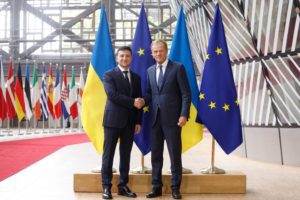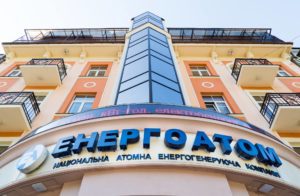
Ukrainian President Volodymyr Zelensky says he hopes for close and fruitful cooperation with new European Commission President Ursula von der Leyen. “My sincere congratulations to Ursula von der Leyen on her appointment as the first female President of the European Commission. I wish you every success and look forward to working with you in close cooperation to develop further strong Ukraine-EU relations,” he said on Twitter.
According to earlier reports, members of the European Parliament voted in support of Ursula von der Leyen’s candidacy for the post of European Commission president in Strasbourg on Tuesday.

Permanent Representative of Ukraine to the European Union Mykola Tochytsky has announced the signing of five documents on cooperation between Kyiv and Brussels at the Ukraine-EU summit. “There will be five documents,” Tochytsky said at a briefing in Kyiv on Monday. According to him, in particular, the documents will concern technical cooperation programs regarding the implementation of the Association Agreement with the EU, as well as decentralization and the fight against corruption.
In addition, a document on the work of infrastructure projects in Donbas is to be signed.
“The EU sent a group of experts who traveled from Mariupol to Zaporizhia and offered a project sum of 10 million for infrastructure projects, opening a special EU office in Mariupol,” said Tochytsky.

National Nuclear Generating Company Energoatom and France’s Technetics Group have signed a memorandum of cooperation in the nuclear and energy sphere.
The press service of Energoatom reported that the agreement was signed on June 19, 2019 in Brussels.
During the talks, the parties pointed out their interest in establishing direct business relations between the enterprises and reached arrangements on this issue. Representatives of Energoatom notified the Technetics Group about their interest in purchasing spare parts for pipeline fittings and pneumatic power drives made by the French company.
The Technetics Group is part of the EnPro Industries group of companies. It is a large supplier of engineered industrial products, sealing solutions for nuclear energy, heat energy, semiconductor, aerospace and biomedical industries.
At the end of June, President of Energoatom Yuriy Nedashkovsky, together with CEOs of the leaders of the nuclear industry of the European Union signed a joint manifesto on preventing climate change and maintaining the economic efficiency of the EU energy industry.

Secretary of the National Security and Defense Council of Ukraine Oleksandr Danyliuk held a meeting with Indian Ambassador Partha Satpathy on Wednesday, during which the parties discussed the state of cooperation in the field of security and defense and prospects for its further intensification. “Satpathy stressed the importance of Ukraine as a strategic partner of India in the field of military-technical cooperation, in particular, the production and supply by Ukraine of gas turbine engines for ships and joint projects in the field of aviation,” the press service of the NSDC reports.
Also, the Ambassador of India assured of the unchanged support for the sovereignty and territorial integrity of Ukraine.
According to Danyliuk, to enhance cooperation at the strategic level, the current exchange of information between Ukraine and India on security issues is relevant today.

Kyiv Mayor Vitali Klitschko has signed a Memorandum with the French company “Veolia Central & Eastern Europe S.A.” on cooperation in the field of solid waste management, the press service of the Kyiv city state administration has reported. “Kyiv is committed to working with reputable international companies with successful experience in implementing projects in the field of waste management. The Veolia Group is one of the world leaders in developing solutions for managing water supply systems, waste and energy. Therefore, I am pleased to announce that today we are signing a Memorandum of Cooperation with the French company Veolia Central & Eastern Europe S.A.,” Klitschko said.
The mayor of Kyiv noted that the capital has clear plans for a gradual departure from the technology of dumping garbage – both from an outdated and environmentally dangerous methodology.
In July, the city authorities intend to launch pilot projects on the separate collection of municipal solid waste in the capital.
“We plan to install up to 3,000 containers for individual fractions – plastic and glass. We met with the carriers of garbage and offered them to develop and implement a pilot project of separate collection in the territories where they work. It is very important that these are different models proposed by enterprises and we will determine the most effective ones,” he added.
The plans of the mayor include developing utility-type waste sorting, transferring of recycled materials for recycling, and also he plans to create a garbage processing complex with equipment for efficient processing of organic and other fractions.
“We plan to build a waste recycling complex, which will have a total processing capacity of 700,000 tonnes per year and will include a sorting stage. We plan to place this waste recycling plant next to the Energia plant, which will be made ecologically safe,” Klitschko said.
The Veolia company expressed hope that cooperation with Kyiv would be effective.
COOPERATION, KLITSCHKO, MANAGEMENT, MEMO, SOLID WASTE, VEOLIA COMPANY

Ukraine International Airlines (UIA, Kyiv) has announced the launch of a strategic partnership with the U.S. network of duty free shops Duty Free Americas (Florida), UIA Vice President Serhiy Fomenko and the vice president of Duty Free Americas have said at a press conference at Boryspil International Airport (Kyiv).
According to them, in particular, UIA and Duty Free Americas are launching a pre-order duty free service.
Fomenko said the pre-order duty free service will provide passengers with the opportunity to order duty free goods not at the airport but online, along with an invitation to check-in.
There will be 5,000 goods in the catalog. It will be available to passengers on the airline’s website in July 2019.
Duty Free Americas is a network of duty free shops in the United States, Mexico and Latin America. It was founded in 1983 and is based in Hollywood (Florida, the United States). Previously, the company was known as World Duty Free Americas, and was renamed Duty Free Americas in October 2001.